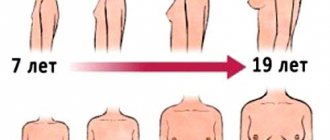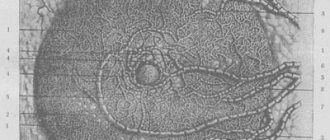Mastopathic chest pain
The characteristic breast pain is accompanied by swelling, hardness and is often associated with another disease - endometriosis. Pain from mastopathy usually goes away with the onset of menstruation, and then returns almost immediately. The cause of mastopathy is usually hormonal disorders. The changes usually appear between the ages of 30 and 40 and gradually disappear after menopause. To confirm them, it is necessary to do an ultrasound, measure the level of hormones in the blood, and sometimes a mammogram. Hormonal drugs are used in treatment.
The reason is menstruation
One of the main reasons for the deterioration of nipple sensitivity is the beginning of the menstrual cycle. At this time, a change in hormonal levels occurs. However, after a few days everything goes away, and the woman is no longer bothered.
A feeling of discomfort in the mammary glands can occur at different times of the menstrual cycle:
- Immediately before the period (second phase of the cycle), when there is an increase in progesterone levels in the body and, as a result, breast swelling.
- During ovulation, when the body actively produces the hormone estrogen, which directly affects the genitals. Increased nipple sensitivity due to ovulation is rare, but no one is immune from this unusual reaction.
- In the middle of the cycle. Unpleasant sensations appear as a result of a decrease in the amount of estrogen, as well as the release of the Latin hormone.
Hormonal changes are a natural physiological process, and unless there are other symptoms, there is no cause for concern.
Breast pain caused by bra
Diseases can have very mundane causes, for example, injuries caused by strong seat belt tension in a car when braking. Breast pain also affects women who wear ill-fitting bras (for example, with cups that are too small). When shopping for a bra, be sure to measure the circumference under your bust and around your chest at nipple level. There should be 1-2cm of sag in the cups because breasts swell and change shape over the course of a month, and under the bust the bra should fit snugly but not cut into the body. Be careful with underwire bras as they can put too much pressure on your breasts and cause pain.
Pregnancy as a cause of sensitivity
No less than during menstruation, nipples become more sensitive during pregnancy, in its early stages. This phenomenon is associated with strong changes occurring in the mammary glands as a result of hormonal changes.
The breasts and their tissues swell greatly, the nipples begin to protrude, they re-align with the mammary glands, the whole body is preparing for changes - pregnancy, breastfeeding.
A woman begins to produce another hormone responsible for sensitivity, care and other similar feelings that a mother needs to raise her children - oxytocin, which affects the mammary glands and their sensitivity.
Sensitive nipples during pregnancy are a sign that a woman and her mammary glands are preparing for childbirth and breastfeeding, which leads to changes:
- Dilation of the mammary gland ducts.
- Loosening of glandular tissue.
- Milk separation.
Neoplastic chest pain
Breast pain caused by cancer usually only appears when the tumor usually grows more than 1 centimeter, and the woman feels it during a breast self-exam. In such a situation, quick diagnosis is important. Therefore, you should definitely consult a doctor if you feel any changes in your breasts. In the vast majority of cases, the disease is curable. Surgery is required, and in the case of a malignant tumor, surgery and chemoradiotherapy. Every woman should remember about breast cancer prevention, which should include regular examinations, that is, from the age of 25, an ultrasound examination is required once a year, and after 50, a mammogram. Moreover, every month, after the end of menstruation, a woman should perform a breast self-examination. If she does them regularly, she will be able to detect any alarming changes. In the case of breast cancer, genetics are also important - women who have had or have mothers, grandmothers or aunts in the family who have suffered from this disease in the past should be regularly examined. It is very important to check whether any women in your immediate family have suffered from breast cancer. BRCA1 and BRCA2 genetic tests should then be performed to confirm or rule out mutations in the genes responsible for the formation of not only breast cancer, but also ovarian cancer.
Common causes of breast tenderness
Increased nipple sensitivity can be temporary, natural, and without serious danger. Or, on the contrary, they indicate manifestations of pathology, deviations from the norm.
Natural causes of nipple sensitivity include:
- Menstruation (eg, missed period due to hormonal changes)
- Pregnancy
- Lactation period
- Ovulation
- Climax
Often, in addition to discomfort, painful sensations when touching the breast, especially when in contact with a man, when a guy or loved one caresses a woman, she also exhibits other symptoms:
- Pain in the mammary glands
- Itching
- Skin redness
- Combustion
- Swollen nipples
- Breast augmentation
These symptoms can also occur as a result of natural causes. However, do not forget to avoid complications and prevent deterioration of health.
Pain when feeding
A mother is a person who showers her baby with love, care and tenderness in the first months of life and is the main source of food for the baby. Without this opportunity given by nature, humanity probably would not have been able to survive for so long. However, sometimes severe nipple pain prevents mothers from fulfilling their role in breastfeeding.
Even after the baby is born, breast and nipple sensitivity may persist. This is because of the mistakes women make when breastfeeding.
To reduce discomfort, soreness and burning sensation in the nipples, mothers are advised to:
- Choose good, comfortable underwear that will support your breasts in the correct position to minimize the risk of injury.
- Correctly attaching the baby to the breast prevents the formation of microcracks in the nipple, which makes feeding painless. You should not touch the breast unnecessarily to avoid injury.
- In case of any ailments or questions, it is better to immediately contact a specialist - a mammologist.
In some cases, pain is felt as a result of:
So, let's start, 29 first signs of pregnancy in the early stages:
- Implantation bleeding . When a fertilized egg enters the walls of the uterus, a slight discharge of blood may occur. If there is profuse bleeding, you should immediately consult a doctor.
- Nagging pain in the lower abdomen can also be the first signs of pregnancy before menstruation. You will feel slight cramps, the uterus will contract and give you the feeling of premenstrual pain.
- Basal temperature . Its increase - this first sign of pregnancy is one of the most accurate, with the exception of serious gynecological diseases. Let us remind you that the basal temperature is measured in the rectum in the morning; during pregnancy it will remain more than 37 degrees.
- Delayed menstruation . However, it is worth remembering that there can be many reasons for cycle disruption, and to accurately determine the first signs of pregnancy, it is necessary to exclude possible causes of delay, such as stress, menopause, excessive physical activity, lack or, conversely, excess weight and others.
- Menstruation is not like previous ones . This sign of pregnancy in the first days can manifest itself as: less abundant discharge, a shift in the cycle, a change in its duration.
- Toxicosis . The most common first sign of pregnancy before delay. Morning sickness and malaise may indicate pregnancy.
- Breasts swell. This is another common sign. You will notice that the breasts are swollen and enlarged.
- Breast sensitivity increases.
- The labia will change color , they will become more swollen and take on a bluish tint. As a rule, this sign is noticed by the gynecologist during examination.
- Fatigue and drowsiness are also sure signs of a pregnant woman.
- Increased sensitivity to smells is one of the first signs of pregnancy before your period. Your sense of smell will change, smells will be more pronounced, and your feelings for them will be heightened.
- , a change in taste preferences may also be a sign . You may want new foods, in different combinations.
- Intuition . Many women feel their pregnancy intuitively.
- An increased urge to urinate, mainly at night, may also indicate pregnancy.
- Changes in sexual desire . This occurs due to changes in the sensitivity of many receptors in the body of a pregnant woman.
- Montgomery tubercles on the areola of the breast - small bumps.
- The appearance of age spots on the face .
- A dark line in the lower abdomen , as a rule, appears by the end of the first trimester and is a sign of pregnancy at 2-3 months.
- The appearance of spider veins not only on the legs, but also on the face, neck, and chest.
- Stretch marks . This sign of pregnancy appears after 3 months, when the tummy begins to grow. Stretch marks appear due to rupture of collagen fibers, which are responsible for the elasticity of the skin.
- A sign of pregnancy will also be an increase in the size of the uterus , this will be determined by the doctor at the appointment.
- Abdominal enlargement . This sign becomes clearly visible after the third month, but in some women the tummy begins to increase in the second month of pregnancy.
- Changes in the shape of the uterus can also be determined at an ultrasound appointment with a gynecologist.
- Positive pregnancy test . As a rule, modern tests only err in the opposite direction - they may not show pregnancy; if the test shows two lines, then this is one of the most accurate first signs of pregnancy before menstruation.
Diseases and pathologies
Uterine fibroids, which can increase breast volume, increasing nipple sensitivity. The disease affects hormonal levels and metabolism.
- Polycystic ovary disease, which can significantly increase estrogen production. If you ignore the disease, the sensitivity is felt more and more, constantly progressing.
- Candidiasis is a fungal disease accompanied by itching, pain, swelling of the nipples, and the formation of cracks and blisters on them. The infection can enter the baby's body through breast milk.
- The endometrium of the uterus - the nipple and areola are the most affected.
- Lactostasis, which develops due to stagnation of milk in the breast.
- It is recommended to discuss any changes or unpleasant sensations that cause suspicion with a specialist - a mammologist. Do not delay contacting a doctor if pain is additionally accompanied and intensified by the following symptoms:
Itching
- Skin redness
- Inverted nipple
- Changes in breast shape
- Breast tenderness may indicate:
Inflammatory processes in the body
- Infectious diseases (mastitis)
- Malignant neoplasms (oncology)
- Mastopathy
- Tubular papilloma or other tumors
- Recovery, recovery from illness, and reduction of breast sensitivity is much more difficult than it seems at first glance. Therefore, it is better to avoid such problems. To do this you need:
Accurate signs of pregnancy:
- The hCG pregnancy test is the most accurate sign of pregnancy.
- An ultrasound of the fetus at 7-12 weeks of pregnancy will give an accurate guarantee of the presence of pregnancy.
- The fetal heartbeat can be heard from the 12th week of pregnancy. The normal fetal heart rate is 120 – 160 beats per minute.
- Feeling the fetus is available in late pregnancy. Obstetricians can use it to determine the position of the fetus in the womb.
- Fetal movement . As a rule, it begins at 20 weeks of pregnancy.
If you see many of the first signs of pregnancy described, consult your doctor to accurately determine your situation. We hope you become a mother soon! Health to you and your baby!











